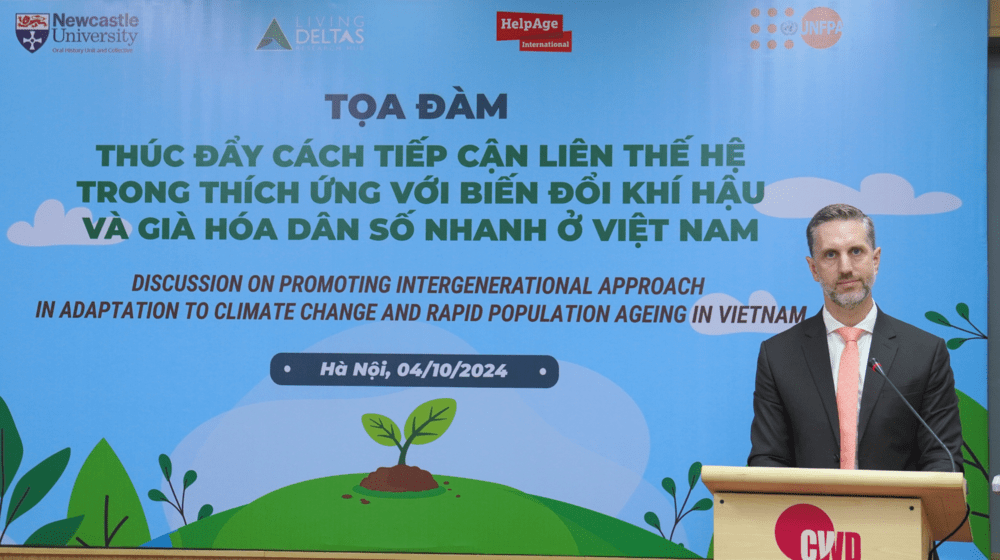Opening Remarks by Matt Jackson, UNFPA in Viet Nam Representative at the Dialogue "Intergenerational Approaches to Adaptation and Mitigation of Climate Change and Rapid Aging Population in Viet Nam"
Dear Mr. Phan Van Hung, Deputy Chairperson of Viet Nam Association for Older Persons.
Dear Ms. Tran Bich Thuy, Country Representative, Help Age International.
Dear Representatives of Ministries and Agencies.
Colleagues and friends. Xin chào quý vị
Today we are celebrating the resilience and strength of Viet Nam’s older population and also the commitment of the Government of Viet Nam to support older persons, especially in the face of challenges such as climate change.
We know that globally, the impacts of climate change such as extreme weather, flooding, droughts, sea level rise, etc are becoming more and more visible. Adapting to the likely impacts as well as boosting the resilience of our communities, including through Action Plans, is crucial to ensuring that local populations and the services they depend on receive minimal impact. This is particularly important for those most vulnerable or those who depend heavily on these services. The aftermath of the devastating typhoon Yagi last month is an unfortunate example of the loss of life, property, and livelihoods that can be caused. UNFPA, and indeed the whole UN, stands with those affected by typhoon Yagi and are supporting the government in its response efforts.
The Government of Viet Nam recently launched the Action Month for Older Persons – Tháng Hành động vì người cao tuổi Việt Nam, to take place in October which recognises and celebrates the invaluable contributions of older people, while also committing to actions that protect, care for, and elevate their roles in society. This is a clear signal of Viet Nam's prioritisation of both inclusion and protection of its citizens, especially those most vulnerable.
With this in mind, it is important to reflect on the interconnections between the climate crisis and demographic shifts. Not least older people often experience disproportionate impacts as well as being more vulnerable to exclusion, neglect, and the damaging effects of climate change.
Let’s be clear: population ageing is a great sign of development and a testament to socioeconomic and healthcare advances, as well as improved living standards. Viet Nam began its ageing process in 2011 with 10% of its population above 60. Today, this has reached 16% and is projected to rise to over 20% by 2036 marking Viet Nam’s transition to an aged society. This provides opportunities for Viet Nam to create policies that both care for older citizens and celebrate their contributions.
Viet Nam is one of the top ten countries predicted to be most affected by climate change over the next two decades. Rising global temperatures will increase the frequency and severity of extreme weather events, including storms and floods which disproportionately affect the older population. Due to pre-existing health conditions and limited access to age-friendly infrastructure, older persons are often the most vulnerable in times of crisis.
However, these challenges are not unique to Viet Nam. Every country must find its own way to respond - ensuring that all citizens, especially the most vulnerable, are treated with dignity and respect. This is where policies, laws, and guidance come into play. Viet Nam has already demonstrated tremendous leadership in this area.
At UNFPA, we are proud to collaborate with the Government of Viet Nam in addressing these intertwined challenges. Together, we are:
- Improving policies that adopt integrated, gender-transformative, and life-cycle approaches to address inequalities and enhance resilience.
- Strengthening the social protection system, promoting universal healthcare coverage, and increasing access to essential services for vulnerable groups.
- Piloting and scaling up integrated care for older persons through the intergenerational self-help clubs, which foster trust, connectedness, and reciprocity among generations.
These initiatives not only provide support but also empower older persons and their caregivers to lead dignified, fulfilling lives. The integrated care model is an excellent example of how local solutions can foster national progress, enhancing social capital and meeting the specific needs of local people.
Today’s event stands as a powerful reminder that we all have a role to play in building a more inclusive, resilient, and sustainable society. Collaborative efforts that build resilience and sexual and reproductive health care into climate action can ensure a future where every citizen, young and old, can live with dignity, happiness, and security.
I would like to thank HelpAge International in Viet Nam for its excellent collaboration in piloting and scaling up the ICOPE model in Thanh Hoa and co-organizing this important dialogue.
I look forward to a fruitful discussion that enhances an integrated and coherent social protection system, applying life-cycle and gender transformative approaches for ageing and meeting the individual needs of the most vulnerable groups to ensure that no one is left behind. Xin cảm ơn


